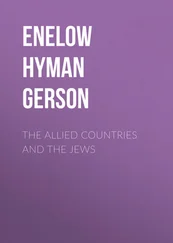There remains, then, only the solution of segregation; a word which (I repeat) I use in a completely neutral manner though it has unhappily obtained in this and other issues a bad connotation.
Segregation, as I have said, may be of two kinds. It may be hostile, a sort of static expulsion: a putting aside of the alien body without regard to that body's needs, desires or claims; the building of a fence round it, as it were, solely with the object of defending the organism which reacts against invasion, and suffers from the presence within it of something different from itself.
Or it may take an amicable form and may be a mutual arrangement: a recognition, with mutual advantage, of a reality which is unavoidable by either party.
The first of these apparent solutions has been attempted over and over again throughout history. It has had long periods of partial success, but never any period of complete success; for it has invariably left behind it a sense of injustice upon the Jewish side and of moral ill-ease upon the other.
There remains, I take it, no practical or permanent solution but the last. It is to this conclusion that my essay is meant to lead. If the Jewish nation comes to express its own pride and patriotism openly, and equally openly to admit the necessary limitations imposed by that expression ; if we on our side frankly accept the presence of this nation as a thing utterly different from ourselves, but with just as good a right to existence as we have; if we renounce our pretences in the matter; if we talk of and recognize the Jewish people freely and without fear as a separate body; if upon both sides the realities of the situation are admitted, with the consequent and necessary definitions which those realities imply, we shall have peace.
The advantage both parties—the small but intense Jewish minority, the great non-Jewish majority in the midst of which that minority acts—would discover in such an arrangement is manifest. If it could be maintained—as I think it could be maintained—the problem would be permanently solved. At any rate, if it cannot be solved in that way it certainly cannot be solved in any other, and if we do not get peace by this avenue, then we are doomed to the perpetual recurrence of those persecutions which have marred the history of Europe since the first consolidation of the Roman Empire.
It has been a series of cycles invariably following the same steps. The Jew comes to an alien society, at first in small numbers. He thrives. His presence is not resented. He is rather treated as a friend. Whether from mere contrast in type—what I have called "friction"—or from some apparent divergence between his objects and those of his hosts, or through his increasing numbers, he creates (or discovers) a growing animosity. He resents it. He opposes his hosts. They call themselves masters in their own house. The Jew resists their claim. It comes to violence.
It is always the same miserable sequence. First a welcome; then a growing, half-conscious ill-ease; next a culmination in acute ill-ease; lastly catastrophe and disaster; insult, persecution, even massacre, the exiles flying from the place of persecution into a new district where the Jew is hardly known, where the problem has never existed or has been forgotten. He meets again with the largest hospitality. There follows here also, after a period of amicable interfusion, a growing, half-conscious ill-ease, which next becomes acute and leads to new explosions, and so on, in a fatal round.
If we are to stop that wheel from its perpetual and tragic turning, there seems to be no method save that for which I plead.
The opposition to it is diverse and formidable but can everywhere be reduced upon analysis to some form of falsehood. This falsehood takes the shape of denying the existence of the problem, of remaining silent upon it, or of pretending friendly emotions in public commerce which are belied by every phrase and gesture admitted in private. Or it takes the shape of defining the problem in false terms, in proclaiming it essentially religious whereas it is essentially national. Worst of all, it may be that very modern kind of falsehood, a statement of the truth accompanied by a statement of its contradiction, like the precious modern lie that one can be a patriot and at the same time international. In the case of the Jews, this particular modern lie takes the shape of admitting that they are wholly alien to us and different from us, of talking of them as such and even writing of them as such, and yet, in another connection, talking and writing of them as though no such violent contrast were present. That pretence of reconciling contradictions is the lie in the soul. Its punishment is immediate, for those who indulge it are blinded.
All opposition that ever I have met to the solution here proposed is an opposition sprung from the spirit of untruth; and if there were no other argument in favour of an honest and moral settlement of the dispute, the one argument based on Truth would, I think, be sufficient. It is a social truth that there is a Jewish nation, alien to us and therefore irritant. It is a moral truth that expulsion and worse are remedies to be avoided. It is an historical truth that those solutions have always ultimately failed; the recognition of those three truths alone will set us right.
Such is the main thesis of this book, but it needs an addition if its full spirit is to be apprehended, and that addition I have attempted to express in the last chapter.
If the solution I propose be the right solution, it yet remains to be determined whether it should first take the form of new laws from which a new spirit may be expected to grow, or first take the form of a new spirit and practice from which new laws shall spring. The order is of essential importance; for to mistake it, to reverse the true sequence of cause and effect, is the prime cause of failure in all social reform.
As will be seen by those who have the patience to read to the end of my book, I have, in its last pages, pleaded strongly for the second policy. It would be impossible to frame in our society, and in face of the rapidly rising tide of antagonism against the Jews, new laws that would not lead to injustice. But if it be possible to create an atmosphere wherein the Jews are spoken of openly, and they in their turn admit, define, and accept the consequences of a separate nationality in our midst, then , such a spirit once established, laws and regulations consonant to it will naturally follow.
But I am convinced that the reversing of this process would only lead first to confusion and next to disaster, both for Israel and for ourselves.
CHAPTER II
THE DENIAL OF THE PROBLEM
Table of Contents
I have stated the Problem. There is friction between the two races—the Jews in their dispersion and those among whom they live. This friction is growing acute. It has led invariably in the past (and consequently may lead now) to the most fearful consequences, terrible for the Jew but evil also for us. Therefore that the problem is immediate, practical and grave. Therefore a solution is imperative.
But I may be—and indeed I shall be—met at the outset by the denial that any such problem exists. Such was the attitude of all our immediate past; such is the attitude of many of the best men to-day on both sides of the gulf which separates Israel from our world.
I must meet this objection before going further, for if it be sound, if indeed there is no problem (save what may be created by ignorance or malice), then no solution is demanded. All we have to do is to enlighten the ignorant and to repress the malicious: the ignorant, who imagine there is an alien Jewish nation among them, the malicious, who treat as though they were alien, men who are, in fact, exactly like ourselves and normal fellow-citizens.
Читать дальше












